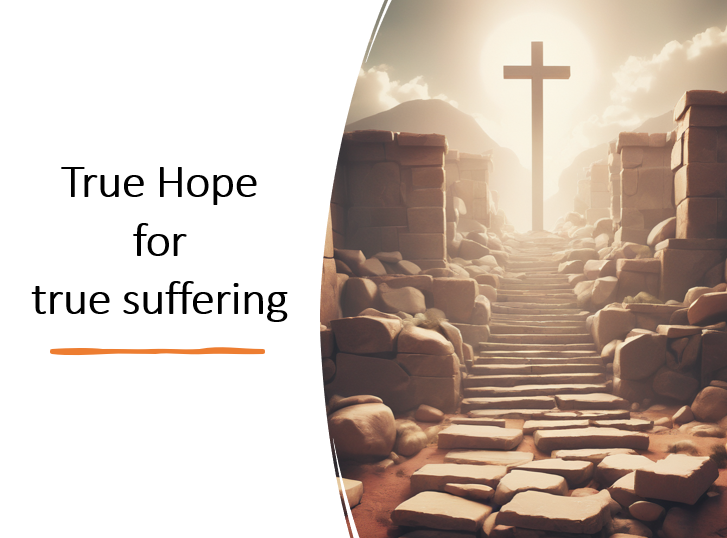
Text: Romans 5:1-11
Theme: True Hope for true suffering
Watch the sermon: https://www.facebook.com/hopelcspoco/videos/1125644702209818 (Starting at 31’30”)
___________________________________
Intr – Two friends were at the coffee shop on a Friday afternoon and the one who was a Christian didn’t seem to feel well. She had undergone so much distress in months, even years, that even her body language could tell that. The other lady, a non-Christian, or at least not church-going person, after listening to her, offered a comment,
-That’s pretty hard on you, isn’t it?
– Yeah, suffering is real in my life. Sometimes it gets really hard.
– “Sorry to hear that”, the other said. “But oh, don’t you go to church regularly? I know you pray and read your Bible and stuff like that. I mean, with all of that, I thought suffering wouldn’t be that real in your life. It wouldn’t be so hard on you, right?
To which the friend replied,
-Me too.
This is a common misconception that we may carry in our life as Christians. Suffering is there, we have some sufferings, but hey, you’re a Christian, right? Show me your smile, clap your hands, be joyful because Jesus died for you.
That’s all true. But sometimes we have the impression that if you only do the right things, you’ll get the right results. If you go to church enough, if you pray enough, if you do your Christian chores enough, then you’ll get the results you want. And sometimes you get into this health and wealth thing, “name it and claim it”, “you will be prosperous, you will be successful.” And when you think you’re climbing the ladder towards all you want, all of a sudden, a big fall comes and you’re back to the ground, shattered in your hopes.
We want to reflect about this today. Not on “why we suffer.” That’s a big question for a long conversation. The first thing we want to do today, from the reading of Romans when Paul talks about suffering, is that suffering is real.
1 – Suffering is real
Your suffering is real, and that is even when you’re a Christian. Or do you think that after I preach beautiful words here, you are encouraged your faith, you go out that door, all problems will be gone? That you will not remember anymore the loved one you lost, your physical problem, your strained relationship, the thing that you know you will carry for life, sometimes even in your body? Absolutely no. Suffering is real. Not in a way that we want to victimize ourselves and be that person no one wants to be around because, you know, “here comes Lucas again with all his problems.” It’s just that: acknowledging that a Christian, you may have sufferings in your life too. We should not try to simply dismiss it.
There are two ways in which we do that, sometimes. One of them is trying to “be positive all the time.” You know, “everything ends well, If it’s still not well, it’s because it’s not the end yet.” Nice. But be careful. For some people, suffering will end just at the very end, only when they die. So it’s not that if you do the right things, eventually you will overcome all your problems and you will be well, and then in the end, all will be well. That’s a nice phrase, but should be used moderately, among other sentences that sometimes we use to cheer people up. It’s good to encourage people, but never forgetting to acknowledge that they are suffering.
Another equivocated way of dealing with suffering is when we think we have a “painometer.” You know, somebody comes to me and says, “I had a really bad cold last well”, and then you go “but I was at the ER with a serious RSV and…” Or somebody comes and says, “my aunt had a fall and broke her arm” and you speech becomes about your aunt that broke two legs and three rib bones and just can’t walk anymore. That type of thing. Sometimes we try to compete on suffering rather than just acknowledging: Your suffering is real; my suffering is real. Let’s talk about it. If you tell me something, I’ll ask you something back. And then if I tell you something, You’ll ask me something back.
Now if we want to look for examples in the Bible, we could go to Abraham. Did you hear about this? Sarai, his wife, is going to be a mother after 90+ years waiting to be one. But you’ll say, “well, that’s pretty rare, kind of an one-off a miracle. I never knew anybody in their 90s having kids.” Well, perhaps Job; we know Job and his patience, his suffering. But again, “I never knew anybody who lost all their children, kids and everything he had and became mortally ill on top of that. You know, it seems again a one-off situation.” Maybe Jesus? He says that he’s going to suffer in men’s hands. But well, He is Jesus… So let’s think about Paul himself, the author of Romans.
There’s a passage in 2 Corinthians that I want to bring to your attention. Look to what he says here. “For we do not want you to be unaware, brothers, of the affliction we experience in Asia. For we were so utterly burdened beyond our strength that we despaired of life itself. “ There’s a pastor who worked in a conclusion paper using this verse to talk about PTSD. He was in a plane with his wife, which they thought was going to crash. Eventually it landed safely. He wrote about it and the challenges of a Christian who is a survivor of trauma.[1] Don’t you think that this is what Paul has here? Paul had a suffering, he says beyond our strength. Remember the thing about “God doesn’t give you more than you can handle?” Sometimes it’s more than we can handle. Sometimes it’s heavy on us. Even for Saint Paul; he underwent something very, very difficult so much that perhaps he thought he was not going to make it. What made the difference? He acknowledged that it “was to make us not to rely on ourselves but on God.”
So first thing, suffering is real. Our congregation has been having this truth even more real recently. This month we had three funerals. That reminds us the reality of death, that even though we have the hope in Christ and we know we are going to be with Christ, when death strikes, it strikes hard, and we suffer and we grieve and we have our sorrows. What that helps us, like it did for Paul, is to make us rely not on ourselves but on God.
Thus, if you come to church sometimes and you’re not feeling well, it’s okay just to sit on the corner and be sad. It’s fine. Maybe that’s your Sunday when you are suffering, you don’t feel like coming, but you come anyways. But you’re not feeling like you have to be joyful. That’s fine. The church is a place for that too, for us to come before the Lord, to open our hearts. Sometimes even being a little angry, it may happen.[2] But suffering is a reality, again, not for us to play the victim all the time, but to acknowledge it can happen to us.
2 – Suffering in the journey
If it can happen to us, we might think we should be prepared for suffering in our journey. Sometimes suffering is localized. Sometimes it lasts a little bit more. But depending on what’s going on in your life, it can last longer.
Now, what happens when you embark in a journey? Does it make a difference if you are leaving your house for one day, one week, one month, or one year? Does it make a difference the way you pack up stuff? Maybe some of you will say, “I just get one shirt, one pants, and I’m good.” But most of us will pack more as we stay out more. And if we think we are moving abroad, and then the packing our stuff changes again. Thus, depending on how you think your journey will be, that’s how you prepare for it. That’s how you prepare to endure it.
Sometimes in our society, we are encouraged to take suffering and pain and everything on a one day, one week, one month basis. We have lots of offers to cope with our sufferings. You’ve got alcohol, you’ve got drugs, you got improper use of your body for your pleasure; You have MAID to end your suffering and so forth. There are many ways in which we are sometimes encouraged not to get prepared on the right place, which is in God, but just to try to find our own way through things.
Here’s another way to think about this preparation. When you read a newspaper or a magazine or a book, you’re aiming for different things, right? A newspaper or website you read for because you want to know what’s going on today, not yesterday. Yesterday is old already. A magazine is for a month or so. A book is for longer. Talk about the Bible, then. That’s real preparation for life.
Paul is talking in Romans that they had undergone many sufferings, but they relied on God and they know that sufferings produce endurance, endurance produces character, and character produces hope.
So, suffering is real. Suffering may be in our journey. Here is where we look to true hope for true suffering.
3 – True Hope for true suffering
After we acknowledge it, after we deal with it under the light of God’s word, we look to the true hope that we have to overcome suffering.
First of all, the great hope and first and foremost hope that you have for your heart and for your life is that God has saved you from the worst suffering ever. That suffering which you will never have to undergo and you will not go through – which is be separated from Him for eternity. The son of God has come in your place to give his own life.
Now think about what Paul says in Romans in our reading today about giving one’s life. For whom would you be willing to give your life? For the leader of Hamas, would you? Think about a politician you don’t like, would you give your life for them? Think about a person you don’t really go along well. Actually, think of any person; who would you give your life for? Paul says Christ gave his life for you while we were still His enemies. While you were still out there, He went to his cross to make you come in here, close to his heart, close to life with him.
That’s the first and foremost true hope that you have. If you have a suffering, it will eventually end. It will go away because when you go to be with Jesus and when we enter eternal life, and true suffering will be gone. True hope. And even true hope will be gone, because we will have love and the presence of God forever. So that’s what brings you to church. That’s what prompts you to daily life is that you have that hope that you have been saved in Christ and that you walk with him.
Now as you suffer, that’s the second aspect of hope. Paul says that we have suffering produces endurance. Endurance produces character. Character produces hope.
Illustration: Before I get to that, I wanted to offer you a piece of cake that I have here. Cake takes flour. Here it is, a piece of cake. Who wants a piece of cake?(offers a spoon of flour). Nope? Okay. Oh, a cake has eggs. I have an egg here. I will crack it open for you already. Anyone? No? Oh, I see, I’m not getting it right. I need to mix this stuff. Okay. A little bit of this, a little bit of that. Chocolate. Who doesn’t like chocolate?… Okay. What else? Oh, baking powder. Also,s ome sugar. You get the point. Anyone?
Let me see(tastes it). Argh, not good at all. Now, is this a real piece of cake? No. But do all those ingredients go in a cake, don’t they? Yes. You need the baking powder. You need the flour. You need the eggs. If you take them on themselves, they’re bitter. You don’t like it at all. You’re not going to eat it for a breakfast or a tea in the afternoon.
Our sufferings in life are there; they’re in the mix. But then as you take this and mix it and put it into the oven and put it, let’s say, through fire, then it starts to produce endurance. And then it starts to produce character. And then you grow in Christ. You learn with your mistakes. Have you heard about this, “learning from your mistakes”? That’s the place to see it as a real thing. You acknowledge when you are under suffering or when you did something wrong. You go back to Christ. He reinforces in you your character. You grow in Him.
Then, eventually what you get out of the oven? You get the actual cake. Now I’m pretty sure most of you would takea piece of it. Well, you know, these days you have gluten-free, dairy-free, and all sorts of different needs, so it would be hard to please everyone. But just imagine that this is a cake that you would eat. Now it is a cake. You know what? All the ingredients are still in here. The egg is here,
The flour is here, the oil is here and whatever else. Bitter things are baked into it. But now it has been made something different, which I will leave here instead of this unsavory thing here.
Suffering produces endurance. Endurance produces character.
As you walk strengthened by the Holy Spirit of God, he produces you hope, True Hope. Not true escape from suffering, but you acknowledge they are baked into your life. And now as God works that in you, you work towards walking with Him. You work towards facing your sufferings, delivering them to God. And knowing that this is not what you want to do, “do the right thing and get the right results.” You might not get what you thought you would. But if you walk with the right person, I assure you, you will get the results you need to face your sufferings, to face your difficulties, to bake the cake and to come out on the other side strengthened by the Holy Spirit. As we sang in the first hymn, maybe just to make it through the day and in the evening say, “it is by your strength that I’m here.” When we walk with the Right Person, we will get the result we need. We’ll get forgiveness of sins, we will get the life everlasting and we will get the presence of God walking with us in our path in life.
Cc – After taking another sip of her coffee, the Christian friend replied: “Me too. I thought that by doing the right things as a Christian, I could obtain the right results.”
She took another sip of her coffee and added
“Going to church last Sunday was the right thing for me to do. Because of that, I was not even going to church, but I decided to; and then my pastor talked to us about true suffering and true hope. He said that I can be a true Christian, trust in Jesus with all my heart and still experience real suffering in my life. What counts is that I have a true hope in my real suffering. Suffering is a part of my life, but Hope has my life in whole.”
Amen.
____________________________
[1] https://www.amazon.com/Deep-Sea-Letters-Survivors-Trauma-ebook/dp/B0B1KS8XJ4
[2] There are reports that that when Luther lost a daughter, he would had written to a friend and said something like, “please talk to God on my behalf. I’m in no condition to talk to God right now.” This goes to express how he was feeling about the grief that was crushing him.
[3] And I’d like also to add a note about difficult times. Times when we are offended or when we are in suffering. Commenting Romans 5, Luther writes: “Those people talk nonsense who attribute their bad temper or their impatience to that which causes them offense or suffering. For suffering does not make a person impatient but merely shows that he has been or is still impatient. Thus a person learns in suffering what kind of man he is.”[3] If we know we should work on our bad temper or impatience, we should ask God to guide us in doing so during GOOD and calm times. Because bad times do not generate them, they reveal them.[Suffering works patience. The word `produces` may guide us to the wrong side. The greek word katergazetai reminds us that sufferings work God`s patience in us].






